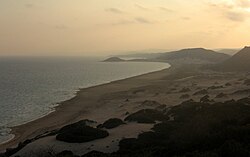
Tourism in Cyprus is a cornerstone of the country's economy, [1] [2] and has significantly impacted its culture and multicultural development throughout the years. [3] [4] In 2006, the tourism industry made up 10.7% of the country's GDP and the total employment in the tourism industry was estimated at 113,000 jobs. [5] Cyprus welcomes at least around 4 million tourists on average each year, [6] making it the 40th most popular destination in the world [7] [8] and the 6th most popular per capita of local population. [9] Cyprus has been a full member of the World Tourism Organization since 1975. [10]






